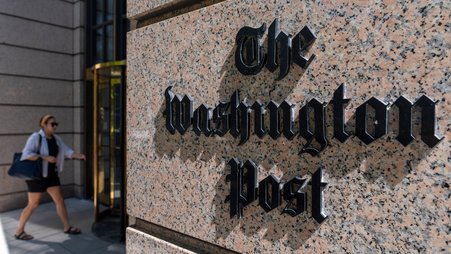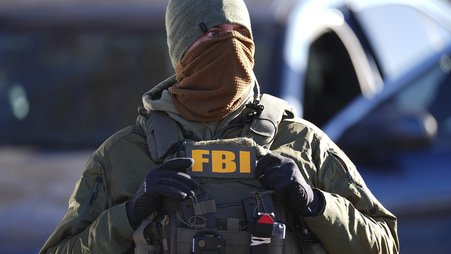Dear Friend of Press Freedom,
Recently unsealed documents further demonstrate that Rümeysa Öztürk has been facing deportation for 304 days solely for co-writing an op-ed the government didn’t like, despite officials being fully aware that she has no known ties to antisemitism or terrorism. Meanwhile, journalist Ya’akub Vijandre remains locked up by Immigration and Customs Enforcement over social media posts about issues he reported on. Read on for more of the week’s press freedom stories, including some much-needed good news.
DOJ fails in ridiculous attempt to prosecute Don Lemon
On Jan. 22, a federal court shut down the administration’s outrageous effort to charge journalist Don Lemon for simply reporting on an anti-ICE protest at a Minneapolis, Minnesota, church. The complaint and supporting affidavit against Lemon and his co-defendants show why. (Lemon’s name is redacted, but the complaint’s description matches the content of his livestream.)
Officials apparently sought to charge Lemon under a federal law banning intentionally obstructing or interfering with places of religious worship. That’s not what he did — his only intention was to document a newsworthy event. They also tried charging him under an equally inapplicable federal conspiracy law. The administration appears to rely on three not-so “smoking guns”: That Lemon livestreamed the protest, that he assured sources he would maintain confidences, and that he approached the pastor and asked him questions. Attorney General Pam Bondi was reportedly “enraged” that a judge did not believe this routine journalistic conduct was criminal.
Now, the government says it’s still exploring other ways to prosecute him. As Freedom of the Press Foundation (FPF) Chief of Advocacy Seth Stern told The Advocate, these attacks are “the latest example of the administration coming up with far-fetched ‘gotcha’ legal theories to send a message to journalists to tread cautiously because the government is looking for any way to target them.”
Judge halts search of records seized from Washington Post reporter
A judge on Jan. 21 temporarily blocked the government from searching data it seized during the outrageous raid on Washington Post reporter Hannah Natanson’s home earlier in the month.
Stern said in a statement that the raid “wasn’t about any criminal investigation, and certainly wasn’t about national security. It was a fishing expedition intended to intimidate and retaliate against a journalist who had managed to cultivate sources all over the government.” He called for the judge to permanently bar the government from snooping into Natanson’s newsgathering. Even if her devices aren’t searched, she needs them back to be able to do her job.
Supreme Court could greenlight tracking reporters’ locations
The Natanson raid reignited discussions about how reporters can protect confidential sources and sensitive information, with some suggesting a return to old-school in-person meetings.
But if the Supreme Court gets it wrong in a new case, Chatrie v. United States, those won’t be safe from surveillance either. FPF Senior Adviser Caitlin Vogus explains why a ruling that the Fourth Amendment’s warrant requirement does not apply to the use of “geofences” to obtain location data could greenlight mass surveillance on an enormous scale, posing a direct threat to journalists and their sources.
Rep. Luna’s stunning First Amendment hypocrisy
Rep. Anna Paulina Luna is leading the charge to subpoena journalist Seth Harp and have him prosecuted for posting the name of a Delta Force commander involved in the abduction of Venezuelan President Nicolás Maduro.
She claims Harp’s reporting violated the Espionage Act (among other completely inapplicable laws). But just a couple of years ago, Luna co-sponsored a resolution calling on the Biden administration to drop charges against WikiLeaks founder Julian Assange. The resolution rightly proclaimed that journalists have a First Amendment right to publish classified information.
Vogus wrote about Luna’s astounding hypocrisy and the need to reform the Espionage Act for Luna’s local paper, the Tampa Bay Times.
FCC’s latest attack on late-night may preview new anti-press strategy
With raids and subpoenas dominating press freedom news so far in 2026, last year’s censorship supervillain, Federal Communications Commission Chair Brendan Carr, has been flying under the radar. He must have gotten jealous, because he’s back.
In an administration full of bootlickers, Carr stands out with pitiful displays of fealty, like his Donald Trump lapel pin. He’s the last person you want deciding which news broadcasts are sufficiently “bona fide” to qualify for editorial independence. And yet, as Vogus explains, a new FCC guidance could position him to attempt just that.
What we're reading
Israel kills 3 journalists in Gaza, including CBS News contributor
Three more journalists, including one who worked for both AFP and CBS, have been added to the devastating tally of the dead, despite the so-called ceasefire. Clearly, Israel and the United States don’t care about the deaths of journalists, or any civilians, in Gaza, but reporters and news organizations must speak out and demand accountability. That includes you, CBS.
ICE escalates war on civilian accountability
ICE frequently cites broad laws and loose concepts to intimidate those who record them. But as Stern explained, “It is not stalking to follow a law enforcement officer to document what they’re up to — that’s constitutionally protected conduct.”
Hours after ABC News ran a story about a Minnesota toy store, ICE agents arrived at their door
Speaking of intimidation: ICE doesn’t want people criticizing them to reporters either, apparently. Scare tactics meant to silence sources are straight out of the authoritarian playbook.
Judge removes Las Vegas Review-Journal staff from courtroom
A judge can’t order journalists not to publish information disclosed in public court records and open court. Judge Jessica Peterson either doesn’t understand the First Amendment or doesn’t care.





